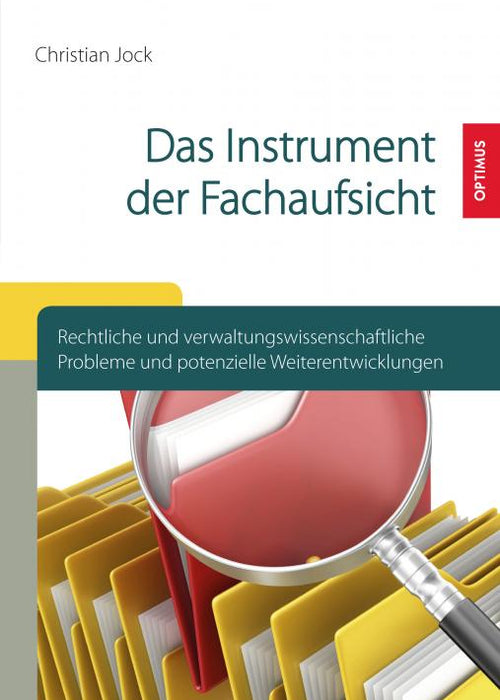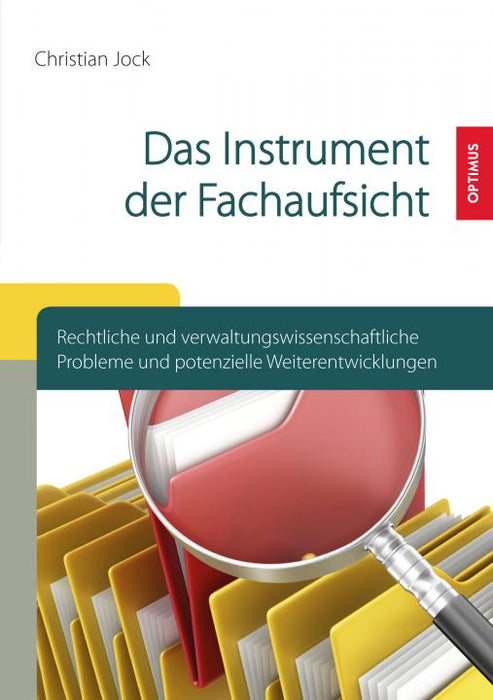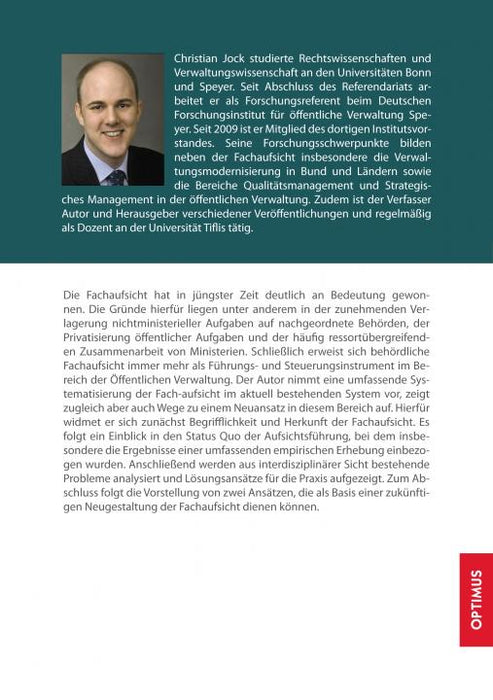The instrument of professional supervision
- Brand: Jock, Dr. Christian
- Availability: 9 In stock
- SKU: 9783941274983
€59,90
Recently, technical supervision has become significantly more important. The reasons for this include the increasing shifting of non-ministerial tasks to subordinate authorities, the privatization of public tasks and the frequent interdepartmental cooperation between ministries. Ultimately, official technical supervision is increasingly proving to be a management and control instrument in the...
Recently, technical supervision has become significantly more important. The reasons for this include the increasing shifting of non-ministerial tasks to subordinate authorities, the privatization of public tasks and the frequent interdepartmental cooperation between ministries. Ultimately, official technical supervision is increasingly proving to be a management and control instrument in the field of public administration. The author carries out a comprehensive systematization of the technical supervision in the currently existing system, but at the same time shows ways to a new approach in this area. For this purpose, he first devotes himself to the terminology and origin of the technical supervision. What follows is an insight into the status quo of supervision, in which in particular the results of a comprehensive empirical survey were included. Subsequently, existing problems are analyzed from an interdisciplinary point of view and practical solutions are shown. Finally, two approaches are presented that can serve as the basis for a future reorganization of technical supervision.
Details
- Title: The instrument of technical supervision
- Subtitle: Legal and administrative problems and potential further developments
- Author: Dr. Christian Jock
- Edition: 1st edition
- Published: 1st edition 12/30/2011
- Subject: Law
- Product Type: Book (Hardcover)
- Product type: Dissertation
- Language: German
- Binding: Softcover (paperback)
- Dimensions: 21.0 x 14.8 cm (DIN A5)
- Extent: 357 pages
- Condition: New (shrink-wrapped in foil)
- Keywords: Supervision, technical supervision, laws, control level, legitimacy, NSM, mandatory tasks, legislation, risk management, control, administration, enforcement, instructions, expediency
Table of Contents
A. Introduction
I. Problem area
1. Increasing importance of technical supervision
2. Effects of an increasingly complex, dynamic environment
3. Pluralization in law enforcement that endangers unity
4. Specialist supervision and independent administrative units
II. State of research
III. Goals of the work / procedure
IV. Structure of the investigation
B. Origin, definition and delimitation of the technical supervision
I. Historical Origin
II. Definitions of technical supervision in the literature
1. Scope
2. Intensity of influence possibilities
III. The concept of (professional) supervision - use and word analysis
1. General language
2. observation function
3. Correction function
4. Examination
IV. Negative Boundaries
1. Differentiation from observation
2. Demarcation from control
3. Separation from line
4. Demarcation from steering
5. Delimitation to the control
6. Demarcation from evaluation
7. Summary
V. Distinctions from other types of supervision
1. Economic supervision
2. Federal Supervision
3. Supervision
4. Legal Oversight
5. Special Supervision
C. Technical supervision today
I. Framework
1. The finances
2. The consequences of demographic change for the personnel structure
3. The increasing globalization
4. Increase in uncertainties due to complex, vague problem situations
5. The change in the understanding of the state - new demands on the state
6. The change of values
7. The rapid development in information and communication technology
8. Consequences of these developments
II. The technical supervision today in positive law
1. Constitutional law
a) Basic Law
b) State constitutions
2. Simple law
a) General organizational law
b) Municipal law
c) Specialist laws
III. The design of the technical supervision today
1. Instruments and objects of professional supervision
2. Specialist supervision within the direct state administration
3.Technical supervision of administrative units/agents with their own legal capacity
a) dualistic model
b) monistic model
IV status quo and internal approaches to the further development of technical supervision in the federal states and at the federal level
1. An overview of the individual approaches
a) Baden-Württemberg
b) Bavaria
c) Berlin
d) Brandenburg
e) Free Hanseatic City of Bremen
f) Free and Hanseatic City of Hamburg
h) Mecklenburg-Western Pomerania
i) Lower Saxony
j) North Rhine-Westphalia
k) Rhineland-Palatinate
l) Saarland
m) Saxony
n ) Saxony-Anhalt
o) Schleswig-Holstein
p) Thuringia
q) Bund
2. Summary: similarities and differences
V. Status quo of technical supervision - An empirical study
1. Design of the survey
a) Research area
b) Criteria for country selection
c) Justification for country selection
2. General methodology and implementation
a) Target group and orientation
b) Design of the questionnaires
c) Implementation and support
3. The survey
a) Participant structure
b) Basic experiences
aa) General experiences
bb) Special features after restructuring
c) Mode of supervision
d) Intensity
e) Frequency of supervisory contacts
f) Regulation density
g) Awareness of the goals
h) Problems with multiple responsibilities
i) Control instruments
j) Risk assessment
k) Need for change
aa) General
l) Use of internet-based tools
aa) Willingness to use
bb) Reasons for rejection
m) General comments
4. Summary / Major Trends
VI. Results of various investigations by the Courts of Audit
1. Federal Audit Office
2. State Audit Office Lower Saxony
D. Problems in the area of technical supervision and possible solutions in the existing system
I. Legal and organizational area
1. Technical oversight of compensation for open statutory governance
2. Specialist supervision as a corrective to the pluralization in execution
3. Technical supervision of different ministries over the same institution
4. Lack of control knowledge
5. Communication and documentation as prerequisites for supervisory activity
6. Ignorance of the goals of supervised task performance
II. Administration, political science and economics
1. Interactions between the technical supervision and the new control model
2. Specialist supervision and ministerial control ambitions
3. Technical supervision as an instrument of quality management
4. More efficient supervision due to better performance of the enforcement authorities
III. Behavioral and managerial culture-related area
1. Lack of factual effectiveness of instructions
2. Intensity and exercise of oversight
3. Incentive Dilemma
4. Oversight Styles
E. Technical supervision - a new approach
I. Risk management systems for technical supervision
1. Origin of risk management: the private sector
a) Content of a risk management system
b) Concept of risk
2. Risk management in the public sector
a) The current situation
b) Dangers of introducing a risk management system
3. The practical and organizational implementation
a) requirements
b) risk management cycle
aa) risk strategy
bb) risk identification / risk recognition
cc) risk analysis and assessment
dd) risk control / risk management / risk strategies
ee) risk monitoring / adjustment of the risk strategy
ff) risk controlling and internal monitoring system
4. Conclusion / Summary Recommendations
II. Internet-based instruments within the framework of technical supervision
1. Internet and Internet use
2. Web 1.0 Tools
a) Chat
b) Forum
aa) Functionality and Technology
bb) Types of Internet Forums
3. Web 2.0
a) Wikis
b) Other Web 2.0-instruments
4 total weighting
F. Summary
I. On the essence of technical supervision
II. Specialist supervision and risk management
III. Supervisory relationships/control distance
IV. Specialist supervision and new control model
V. Communication
VI. Personnel
VII. Specialist supervision as a "learning control system"
VIII. Definition
IX. Summary
Author
Christian Jock studied law and administration at the Universities of Bonn and Speyer. Since completing his legal clerkship, he has worked as a speaker and consultant at the German Research Institute for Public Administration in Speyer. He is also a member of the institute's board of directors. In addition to technical supervision, his research focuses in particular on the modernization of administration in the federal and state governments as well as the areas of quality management and strategic management in public administration. In addition, the author is the author and editor of various publications and regularly works as a lecturer at the University of Tbilisi.
Downloads
.
DRM: Digital Watermark
This eBook contains a digital watermark and is therefore personalized for you. If the eBook is passed on to third parties abusively, it is possible to trace it back to the source.
File format: PDF (Portable Document Format)
With a fixed page layout, the PDF is particularly suitable for specialist books with columns, tables and figures. A PDF can be displayed on almost all devices, but is only suitable to a limited extent for small displays (smartphone, e-reader).
System requirements:
PC/Mac: You can read this eBook with a PC or Mac. You need a PDF viewer - e.g. Adobe Reader.
eReader: This eBook can be read with (almost) all eBook readers. However, it is not compatible with the Amazon Kindle.
Smartphone/Tablet: Whether Apple or Android, you can read this eBook. You need a PDF viewer - e.g. Adobe Reader.
Buying eBooks from abroad
For tax law reasons we can sell eBooks just within Germany and Switzerland. Regrettably we cannot fulfill eBook orders from other countries.



